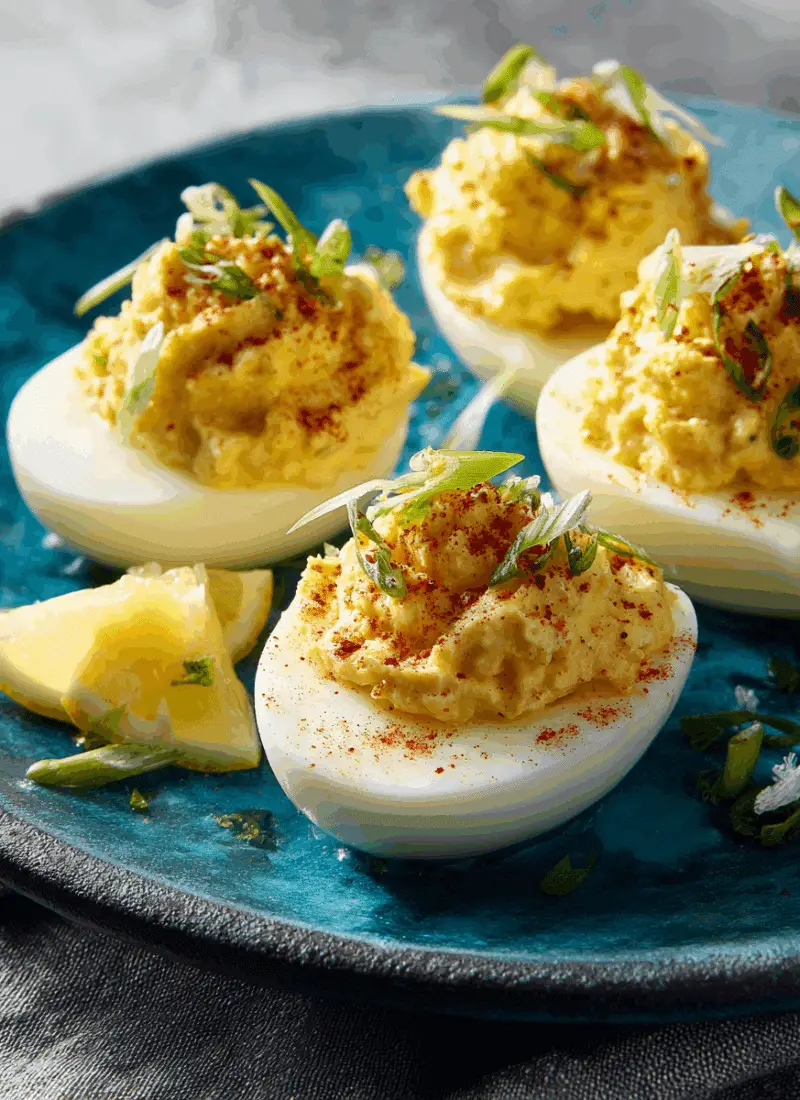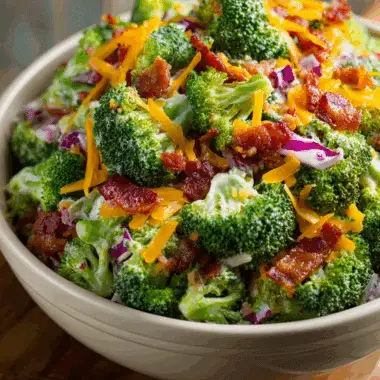Deviled eggs are a timeless party favorite, perfect for any celebration, and a true crowd-pleaser for Labor Day gatherings. These bite-sized delights combine creamy yolks, tangy mustard, and zesty seasoning for a flavor-packed treat that’s both simple to make and irresistibly delicious.
FULL RECIPE
Ingredients
- 6 large eggs
- 3 tablespoons mayonnaise
- 1 teaspoon Dijon mustard (or yellow mustard)
- 1 teaspoon white vinegar
- 1/8 teaspoon salt
- 1/8 teaspoon black pepper
- Paprika, for garnish
- Fresh chives or parsley, finely chopped (optional, for garnish)
Directions
- Place the eggs in a medium saucepan and cover with cold water by about 1 inch.
- Bring the water to a boil over medium-high heat, then cover the pan, remove from heat, and let sit for 10–12 minutes.
- Drain the hot water and transfer the eggs to a bowl of ice water. Let them cool for at least 5 minutes.
- Gently tap and roll each egg on a hard surface to crack the shell, then peel under running water.
- Slice each egg in half lengthwise and carefully remove the yolks, placing them in a medium mixing bowl.
- Mash the yolks with a fork until smooth.
- Add mayonnaise, mustard, vinegar, salt, and pepper to the yolks, mixing until creamy and well combined.
- Spoon or pipe the yolk mixture evenly into the hollowed egg whites.
- Sprinkle with paprika for a classic finish.
- Garnish with chopped chives or parsley if desired, then refrigerate until ready to serve.
Nutrition Facts
- Calories: 62
- Total Fat: 5g
- Saturated Fat: 1.5g
- Cholesterol: 94mg
- Sodium: 88mg
- Total Carbohydrates: 0.3g
- Dietary Fiber: 0g
- Sugars: 0.2g
- Protein: 3g
The History and Popularity of Deviled Eggs
Deviled eggs have a rich history that dates back to ancient Rome, where boiled eggs were seasoned with spices and served as appetizers. The term “deviled” became popular in the 18th century in England, referring to foods that were spicy or zesty. Over time, the recipe evolved into the creamy, mustard-based filling we know today. In the United States, deviled eggs became a staple at family gatherings, potlucks, and holiday celebrations, including Labor Day. Their simplicity, versatility, and ability to please crowds have kept them a timeless favorite across generations.
Why Deviled Eggs Are Perfect for Labor Day
Labor Day often means outdoor gatherings, picnics, and barbecues, and deviled eggs fit right into this festive atmosphere. They are bite-sized, easy to transport, and require no reheating, making them ideal for potluck-style meals. Their creamy texture and balanced tangy flavor pair well with many traditional Labor Day dishes like grilled meats, salads, and fresh vegetables. Plus, they are budget-friendly, easy to make in large batches, and offer a nostalgic comfort food element that appeals to guests of all ages.
Nutritional Benefits of Deviled Eggs
While deviled eggs are indulgent, they also come with a good dose of nutrition. Eggs are a high-quality protein source containing all nine essential amino acids, making them a complete protein. They are rich in vitamins such as B12, D, and riboflavin, as well as minerals like selenium and phosphorus. The yolks provide healthy fats and important nutrients like choline, which supports brain health. By adjusting the filling ingredients, such as using Greek yogurt instead of mayonnaise, you can make them even healthier without sacrificing flavor.
Creative Flavor Variations
The classic deviled egg recipe is delicious on its own, but it also serves as a blank canvas for creative twists. You can add smoked paprika or chipotle for a smoky kick, or incorporate fresh herbs like dill and parsley for a refreshing touch. Bacon crumbles can provide a savory crunch, while pickled jalapeños add a spicy bite. For an international flair, try adding curry powder for an Indian-inspired version or sriracha for a spicy Asian twist. These variations keep the dish exciting and allow you to cater to different taste preferences at your Labor Day celebration.
Serving Presentation Ideas
Presentation can make deviled eggs even more inviting, especially for a holiday like Labor Day. You can use a decorative platter with compartments to keep the eggs from sliding around, or serve them on a bed of lettuce for an elegant touch. For a patriotic theme, consider garnishing with red paprika, blue edible flowers, and a touch of white onion or cheese. Using a piping bag with a star tip to fill the eggs can give them a professional bakery-like look, elevating their visual appeal and making them stand out on the buffet table.
Perfect Pairings for Deviled Eggs
Deviled eggs complement a wide variety of dishes commonly served on Labor Day. They pair beautifully with grilled burgers, hot dogs, barbecued ribs, and roasted vegetables. For a lighter spread, they go well with fresh salads like coleslaw, potato salad, or cucumber salad. They also work alongside cheese platters, charcuterie boards, and even seafood like shrimp cocktails. Their creamy and tangy profile provides a nice contrast to smoky, salty, and spicy foods, making them a versatile choice for any menu.
Make-Ahead and Storage Tips
One of the best things about deviled eggs is that they can be prepared in advance, making holiday hosting easier. You can boil the eggs up to two days before serving and store them in the refrigerator. The filling can be made ahead of time and kept separately in a sealed container, then piped into the egg whites right before serving to maintain freshness. Leftovers should be stored in an airtight container in the refrigerator and consumed within two days for the best taste and food safety.
Diet-Friendly Modifications
Deviled eggs can be adapted to suit different dietary needs. For a keto-friendly version, stick with mayonnaise and avoid any high-carb fillers. For a lighter option, replace some or all of the mayonnaise with Greek yogurt or mashed avocado for a creamy texture with fewer calories. If you need a dairy-free recipe, ensure your mayonnaise is plant-based and avoid any cheese-based garnishes. Adding finely chopped vegetables like celery or bell pepper can boost fiber content and add crunch without extra calories.
Common Mistakes to Avoid
Even a simple recipe like deviled eggs can go wrong without attention to detail. Overcooking the eggs can result in a greenish ring around the yolk and a sulfur-like smell. Peeling can be tricky if the eggs are too fresh, so using slightly older eggs can make the process easier. Avoid adding too much liquid to the filling, as it can become runny and difficult to pipe. Also, under-seasoning is a common issue—taste your filling before adding it to the whites to ensure the flavors are well-balanced.
Conclusion
Deviled eggs are more than just a snack they’re a symbol of sharing, tradition, and creativity, especially during Labor Day celebrations. Their adaptability makes them a perfect addition to almost any holiday menu, and their rich history connects generations through familiar flavors. Whether you stick to the classic recipe or experiment with bold new variations, deviled eggs offer a satisfying combination of taste, nutrition, and presentation.








